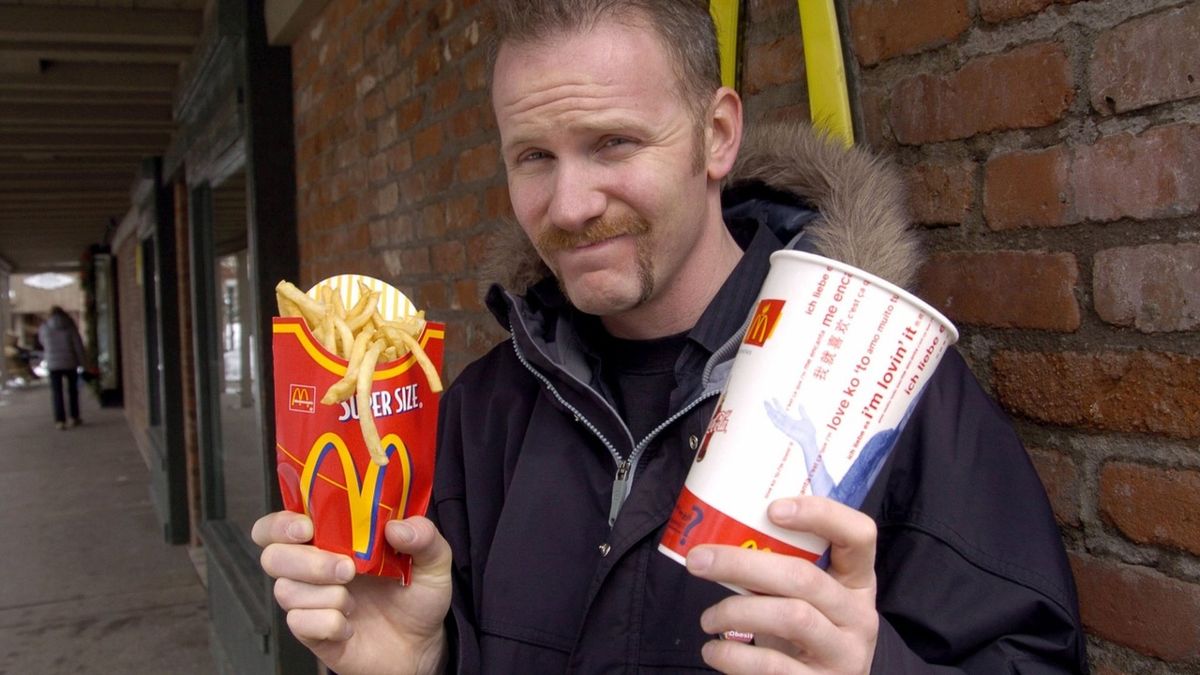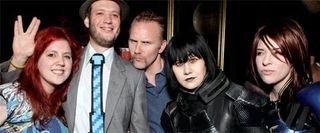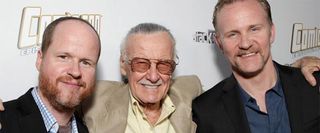Morgan Spurlock On Why He Stayed Behind The Camera For Comic-Con Episode IV: A Fan's Hope

Since making his directorial debut with Super Size Me in 2004, Morgan Spurlock has not only made a name for himself as a documentarian but also as a personality. Just about all of his films feature himself in the middle of the action, whether it’s about eating nothing but McDonalds for 30 days, searching for Osama Bin Laden, or trying to finance a film using only money for corporate sponsors.
For Comic-Con Episode IV: A Fan's Hope, however, he decided to go with a different tactic. Touring the San Diego Convention Center in the film is not Spurlock himself, but rather camera crews following individuals who have a goal to accomplish at the event. But why did Spurlock decide to stay behind the scenes for his latest project? I recently had the chance to find out.
Prior to the film’s release I sat down one-on-one with Morgan Spurlock to talk about not only why he isn’t in the film, but the process behind finding the movie’s subjects, the preparation and editing process, and the passion of the fans. Check it out!
The main difference between this film and your other films is the simple fact that it’s not you in front of the camera and you’re not narrating the story. I’m curious when and why that decision was made.
It came from the very beginning when I first got the idea for the film and my producing partner Jeremy [Chilnick] and I were talking about what would the movie be. For me, Comic Con is what it is, the movie business is what it is, video games, comics, all of those are what they are because of fans. The fans make the story, the fans drive the story, they are the catalyst of the story. So I said, if we’re gonna tell the story, I want it to be about the real fans, the fans who are there, not me as a fan going to Comic Con so now we’re going to make a movie about me as a fan. That’s a very contrived story and it’s not me looking into something like in Where in the World [Is Osama Bin Laden] or Greatest Movie [Ever Sold] or Super Size Me where I’m investigating some sort of a topic. So for me, I never wanted to be in the film. And it was interesting, when we started going to pitch the film to investors, probably the first four or five investors were met with were like, “Okay, we’ll give you money to make the movie, but only if you’re in it.” And I was like, “Well, that’s not the movie we’re going to make. That’s not the movie that I’m going to make, so no.” And the movie works because it’s not that. The movie works because it is about these people.
What the film does in a great way, that I’m also really proud of, is that it humanizes these people that are in this film. It humanizes this idea of geek culture where it’s cool to be a geek now and you’re rooting for these people in this movie. We’re not a fly on the wall laughing at their obsessions. We’re not making fun of them, and over the course of this film you do root for them, you cheer for them, you empathize with them and, for me, it’s great. I’m really proud of the movie. And part of the reason it really works is cause we had such a great team of people. The field directors that were working with each one of our characters, these are directors that we had in their own right. Following each character we had someone like Kief Davidson, who directed Kassim the Dream and Devil’s Miner. You had Mark Landsman, who directed Thunder Soul. You had Josh Weinstein, you had Ross Kauffman, who won the Academy Award for Born into Brothels. So I called all these people up the minute that I knew the film was going to happen and I said, “Would you like to come and work on this for like a week?” I said, “It’s gonna be quick. It’s only going to be a week of your time.” And they’re like, “Absolutely, one week why not?” It was so much fun. We had 150 people working on the movie. It was massive.

With that many people the preparation process must have been totally different than when you made your other films.
CINEMABLEND NEWSLETTER
Your Daily Blend of Entertainment News
Extremely. There was a lot of pre-production that into it because we had to find all the cast, so there was a big casting process, there were the whole logistical problems of the film of “What do you shoot when?”, “Who shoots what?”, “Where do you go from here?” Just putting together that calendar of where we’re sitting, which film crew and what point. Because at any given moment we had 15 film crews with the ability for another 10 cameras to be brought up at any time, so there was anywhere between 15 and 25 cameras rolling in the course of the day – which is just…[laughs]. So we shot about 150 hours in the week, the couple days before and the couple of days after Comic Con, because we followed our characters in and we followed them home. So I think just in that window we shot that much footage and every night we would be done shooting, the cameras and crews would all come back in, we’d start scanning footage, we’d talk to them and start talking about things that were happening, what was happening tomorrow, we put together the schedule for the next day, go sleep for like three hours, and then do it all again.
The editing process must have been insane.
And we had amazing editors, we had Tova Goodman and Tim Smith. Tova, who cut Freakonomics, she also cut the Simpsons Special; Tim Smith, who had worked with the other producer on our film, also a director in his own right, Matthew Galkin, who is producing the film with us – Matthew directed It Might Get Loud, he directed the Kevorkian documentary for HBO. So Tim, who had worked with him as an editor for years, came on because Tova moved to Los Angeles, Tim came on and finished the film and we just had a great group of people. Tim is a great storyteller, as is Tova, and just for them to kind of go through the story and sift through and find the gems that we found. Because what we did was we put together each person’s story independently first and then started to weave it all together into the overarching story.

Speaking of the individual stories, when you’re casting a film like this and looking for subjects, you’re obviously looking for people who are going to Comic Con with different intents, but how much does personality factor into it?
You want to look at the personalities, you don’t want somebody who is going to shut down from you. You want somebody who is actually going to give you something when you talk to them, when you interview them – they’re going to be open and honest about their emotions. They’re not going to suddenly turn off. Like I don’t know if you saw the movie Game Change with Sarah Palin, and how suddenly Sarah Palin just shut down in the middle of the room. So you don’t want to suddenly be shooting and have somebody sitting there going [stares blankly]. “Holly, how do you feel? Holly, the masquerade is in an hour, how do you feel?” And she’s just not talking to you [laughs]. You don’t want that. You want somebody who is like, “I’m nervous, I’m scared, I’m dealing with all this emotion right now.” And so that was part of it. When we would narrow down the field I would call them all on the phone, we’d ask them questions, we’d have them send a second video if we wanted to see them just as though they were having conversations, or as I’m interviewing them on the phone.
But the biggest goal for us with these people was to find people with that. We wanted to find people with real goals. You don’t want to find somebody that’s like, “Yeah, you should follow me, it’s going to be my first con, it’s going to be so awesome I can’t wait.” The end. That’s your whole thing. But somebody who rode up like Anthony, who sent us his tape, he goes, “I want to do this because I make my own action figures at home, my wife kind of hates it but I have my own room where I make special action figures and I’m going there to get this one action figure. I’ve gotten all the collection and I gotta get the Galactus. If I don’t get the Galactus I don’t know what I’m going to do.” You see that guys video and you’re just like, “Yes! Absolutely.” While his isn’t life changing, it’s so incredibly important to him.
It’s the passion.
It’s the passion. And then you have somebody like Chuck Rozanski. Chuck, who Harry Knowles recommended because his father knew Chuck and he’s known Chuck for years, because Harry’s father, I think, basically owned one of the first comic book shops in Austin, was one of the people who was instrumental in creating the first Texas Comic Con, so he had known Chuck from Mile High [Comics]. He goes, “If you’re going to get somebody to talk about the comics, you have to get Chuck.” And here’s Chuck who is fighting against the fact that people aren’t buying paper comics anymore, that business is starting to fall off. So what does he do? How is he going to continue to keep his business afloat? People aren’t collecting like they used to. And so the minute I met Chuck I was like, “This guy is perfect.” He’s a great story because he’s an underdog. You’re still rooting for Chuck, you’re rooting for him to sell and make his money off his comics. You want somebody to buy the Red Raven so bad! Which, side story, he did end up auctioning off in November.
He did? How much did it go for?
I don’t know. We should find out that information out, but he did finally auction it off and basically bought a new facility, moved his comics in there, bought more comics.
I remember at the end of the credits it said that he had gotten a new place.
60,000 square foot facility, yeah. But I think he just sold it in November.

Eric Eisenberg is the Assistant Managing Editor at CinemaBlend. After graduating Boston University and earning a bachelor’s degree in journalism, he took a part-time job as a staff writer for CinemaBlend, and after six months was offered the opportunity to move to Los Angeles and take on a newly created West Coast Editor position. Over a decade later, he's continuing to advance his interests and expertise. In addition to conducting filmmaker interviews and contributing to the news and feature content of the site, Eric also oversees the Movie Reviews section, writes the the weekend box office report (published Sundays), and is the site's resident Stephen King expert. He has two King-related columns.

The WWE's Women's Royal Rumble Just Crowned Its Champion, But I'm More Psyched About The Major WrestleMania 41 Feud It Set Up

‘Leave That Man The F--- Alone’: After Scottie Pippen Claimed Neither Michael Jordan Nor LeBron James Is The Basketball GOAT, Carmelo Anthony Shared Thoughts

I Didn't See Elsbeth's Meghan Markle Joke Coming, But There's A Whole Story Behind Why It Makes Sense
Most Popular







